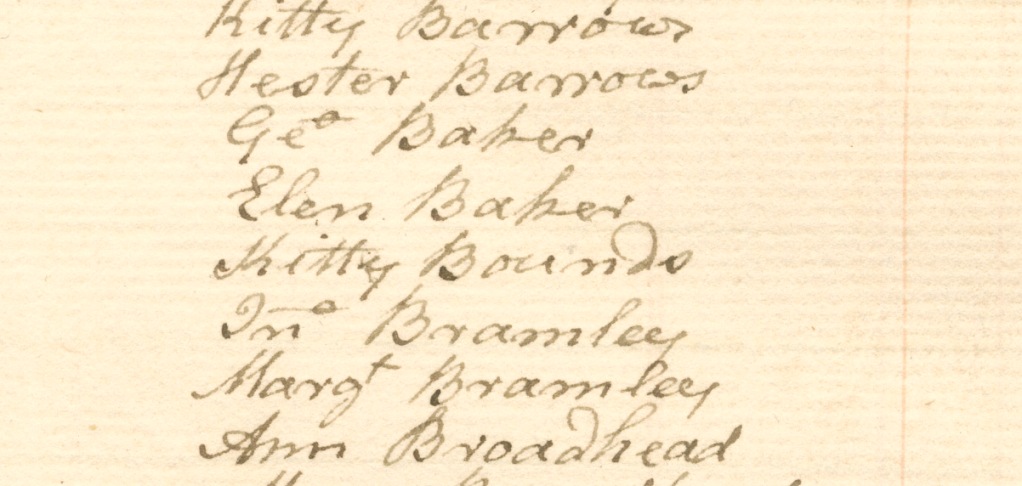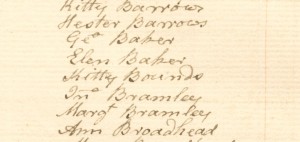
July 11, 2014, by Kathryn Steenson
What’s in a name?
It was Zsa Zsa Gabor who said “I call everyone ‘darling’ because I can’t remember their names”. Perhaps she had never been introduced to people blessed (or cursed?) with creative, unique or downright strange names. Here, in chronological order, are fifteen genuine examples of people’s names taken from the manuscripts that we have come across:
- Original Steele, of Clarborough, Nottingham, was presented before the Archdeaconry Court in 1612 for sexual immorality with the wife of William Tomlinson, actions that certainly did not befit his role as ‘sometime’ churchwarden (Ref: AN/PB/295/3/27).
- Barefoot Booth was a much better-behaved, but no less oddly-named, churchwarden who carried out his duties responsibly in North Wheatley in the 1670s (Ref: AN/PB/343/384).
- Restored Bendall, a framework knitter of Nottingham St Mary, was brought before the Archdeaconry court in 1680 for not receiving Holy Communion (Ref: AN/PB/306/27).
- Dymock Wallpoole and Marmaduke Witham were among the parties mentioned in a deed poll dated 1704/5, although Dymock was not from Gloucestershire and Witham was not from Lincolnshire (Ref: Hn D 5/13/2).
- A baby girl was baptised with the rather sweet name Mercy Puffin in 1718 (Ref: CU/R 3/1).
- Mr and Mrs Crisp ensured a family surname was carried on when they baptised their son Madewell Crisp on 27th July 1726 (Ref: CU/R 3/1).
- Treverse Spilie, whose gender isn’t immediately clear from the records, was baptised in March 1728 (Ref: CU/R 3/1).
- Saintly Whitehead, a blacksmith of Trowell, Nottinghamshire, appears in the Archdeaconry Court records in 1774, but lived up to his honest name by acting as a bondsman to guarantee the good conduct of another (Ref: AN/MB/170/174).
- Rumour has it that Hearsay Wood, aged 22, married Jane Foottitt in 1782 in Newark (Ref:AN/MB/178/61).
- Despite the word meaning ‘foolish’ since the Middle Ages, having it as a first name did not appear to harm Daft Smith, who appears several times organising the financial affairs of the late businessman Samuel Morley in the 1790s (Ref: Mrl).
- Thoroton Pocklington, another example of surnames becoming first names, appears in a series of vouchers and receipts in 1809-1810 (Ref: Ne A 365).
- Stockdale Avison was a member of Castle Gate Congregational Church in the 1830s (Ref: CU/R 2/5/1).
- The energetically-named Kitty Bounds appears in a list of founder members of Broad Street General Baptist Church, Nottingham in 1817 (Ref: Mr R 1).
- In the same year, Webster Whistler was engaged in correspondence with Lord William Bentinck (Ref: Pw Je 901-913).
What is your favourite unusual name you’ve found in the archives?

Extract from a list of founder members of Broad Street General Baptist Church, Nottingham; 1817 (Ref: Mr R 1)

Here at Somerset Archives & Local Studies we also have a bewildering variety of names. Some of my favourites are:
-the brothers Strangeways and Truefoot Mead, who appear in deeds in the 1820s (their sister was mercifully called Frances)
– a man called Purified Buckland, who was tried at the Somerset Quarter Sessions for assault and robbery in 1848
– perhaps the most unusual Biblical Christian name I’ve come across in ten years as an archivist: a girl baptised Keren-happuch at Beercrocombe in 1842 (In the Old Testament, Keren-happuch was the third daughter of Job.)